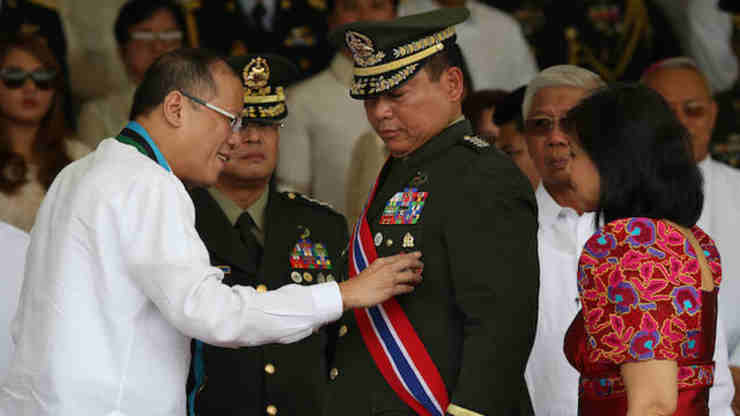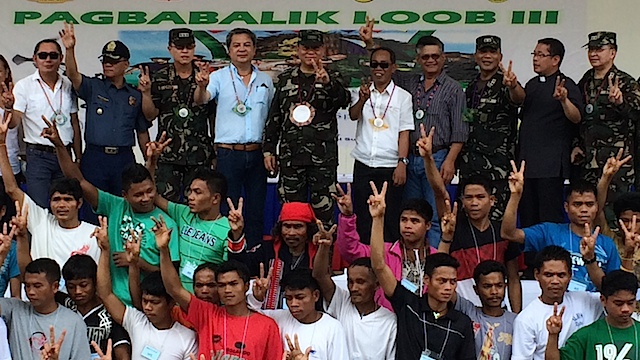From the Philippine Star (Dec 28):
YEARENDER: AFP in defense mode against critics in 2014
 The military drew flak when AFP chief Gen. Gregorio Pio Catapang Jr. and acting Health Secretary Janette Garin visited 132 peacekeepers from Ebola-stricken Liberia while being quarantined on Caballo Island in Manila Bay last month.
The Armed Forces of the Philippines (AFP) found itself in defense mode in 2014 as it parried attacks not just from armed groups but also from critics unhappy with the way it handled major issues.
The military drew flak when AFP chief Gen. Gregorio Pio Catapang Jr. and acting Health Secretary Janette Garin visited 132 peacekeepers from Ebola-stricken Liberia while being quarantined on Caballo Island in Manila Bay last month.
The Armed Forces of the Philippines (AFP) found itself in defense mode in 2014 as it parried attacks not just from armed groups but also from critics unhappy with the way it handled major issues.
To be sure, crisis communication is far from being unfamiliar terrain for the military, which has grappled with controversies that threatened to erode its credibility.
For an institution that has been accused of human rights violations, political partisanship and large-scale corruption, negative publicity is practically a way of life, like rendering a salute to a superior or hearing marching tunes.
The year 2014, however, proved to be an acid test for military communicators who had to defend the controversial moves of their leaders while engaging with citizens who can call them names with just a few clicks or taps.
The military, nevertheless, believes criticism can be a good teacher.
“The year 2014 has been exciting and very challenging. We learned a lot of things,” AFP spokesman Col. Restituto Padilla said in a recent interview.
“All criticisms have positive impact. It can be a source of lessons that can help improve the armed forces,” he added.
Padilla said they would continue to defend the citizens’ right to express their views, including those critical of them.
Against Suselbeck
Among the issues involving the military in 2014, two elicited the most emotional responses in both the real world and cyberspace – the unwelcome visit of the family of slain transgender Jeffrey Laude in Camp Aguinaldo and AFP chief Gen. Gregorio Pio Catapang Jr.’s visit to peacekeepers undergoing quarantine.
On Oct. 22, Laude’s mother and sisters, his German partner Marc Suselbeck and their lawyers tried to enter a facility in Camp Aguinaldo to personally confront US serviceman Joseph Pemberton, the suspect in the killing of Jeffrey.
They were denied entry by Filipino troops who insisted the Mutual Defense Board-Security Engagement Board compound where Pemberton is detained was off limits.
Jeffrey’s sister Marilou and Suselbeck then climbed over the fence, resulting in a 30-minute confrontation between the Laude camp and soldiers. Tensions flared when Suselbeck shoved one of the soldiers guarding the facility, an act that would later earn him deportation.
Despite Suselbeck’s apology, the military moved to have him declared an “undesirable alien,” something that did not sit well with sympathizers of the Laudes.
Some Facebook and Twitter users scored AFP public affairs chief Lt. Col. Harold Cabunoc for supposedly being abrasive when replying to critics of the move to seek Suselbeck’s deportation.
Cabunoc denied being brash to critics. He maintained that he was just voicing his support for proper procedures.
More debates erupted after the AFP awarded a plaque of recognition to T/Sgt. Mariano Pamittan, the soldier shoved by Suselbeck, for displaying “professionalism and restraint” during the confrontation.
Critics said the award was unnecessary because Pamittan was just doing his job. The AFP, however, insisted that Pamittan deserved the recognition because he did not react violently while he was being dishonored.
Against health experts
The military drew flak anew when AFP chief Catapang and acting Health Secretary Janette Garin visited 132 peacekeepers from Ebola-stricken Liberia while quarantined on Caballo Island in Manila Bay.
The Nov. 16 visit was supposed to convey the message that the peacekeepers should not be ostracized because they were not displaying symptoms of the virus.
However, the move was heavily criticized by health experts who believe Catapang and Garin broke protocol when they met with peacekeepers even if the three-week quarantine period was not yet finished.
They noted Catapang and Garin were not wearing protective equipment when they interacted with the troops.
Catapang, however, insisted that no protocol was broken during the visit, saying it was sanctioned by health officials.
Those against the visit argued the issue was not about whether the peacekeepers were contagious but the inability of officials to take their own rules seriously.
The peacekeepers have tested negative for Ebola and are now enjoying a long holiday break with their families.
Against Singha
The AFP was also in defense mode before the international community after Filipino peacekeepers made a daring escape from Syrian rebels in the Golan Heights.
The peacekeepers figured in a standoff last Aug. 28 after they were surrounded by hundreds of Syrian insurgents.
Before the standoff, the militants held hostage 45 Fijian soldiers who agreed to surrender their weapons. The Fijians were freed two weeks later.
Philippine officials claimed that Lt. Gen. Iqbal Singh Singha, the chief of the United Nations Disengagement Observer Force (UNDOF), had ordered the Filipino troops to surrender to ensure the safe release of the Fijians.
The Filipino contingent, however, refused to give up their firearms, believing this would make them helpless against the insurgents. The peacekeepers stood their ground until they were rescued by UN troops from different countries on Aug. 30.
The AFP called for an investigation on Singha for supposedly endangering the lives of Filipino soldiers,
Singha fought back by saying the Filipino troops committed an “act of cowardice” that placed the lives of the Fijian hostages at risk. He also scored the Philippine contingent for deserting their posts and breaking the chain of command.
Whether the UN conducted a probe on Singha remains uncertain as the issue died down. However, the UNDOF chief acknowledged the bravery of Filipino and Fijian troops during a briefing to the UN Security Council in New York last October.
Other highlights
Despite these issues, 2014 was not totally unkind to the Department of National Defense (DND) and the 125,000-strong armed forces.
For the DND, one of the most significant developments was the signing of the Enhanced Defense Cooperation Agreement (EDCA) between the Philippines and the United States last April 28.
A product of talks over eight months, the EDCA will provide the US greater access to military facilities in the country to enhance the Philippines’ territorial defense capabilities. It will also allow US troops to pre-position equipment in mutually agreed upon areas.
The agreement was signed just hours before US President Barack Obama arrived in the Philippines for a two-day state visit.
The constitutionality of the deal has been challenged before the Supreme Court by former senators and activists who believe it violates Philippine sovereignty.
The DND also signed the contracts for the purchase of 12 lead-in fighter trainer jets worth P18.9 billion from South Korea and eight combat utility helicopters worth P4.8 billion from Canada.
The military can also claim gains in its internal security operations.
On Aug. 12, security forces arrested retired general Jovito Palparan Jr., labeled “The Butcher” by militant groups.
Palparan has been charged with kidnapping and serious illegal detention over the disappearance of University of the Philippines students Sherlyn Cadapan and Karen Empeño in 2006.
The former commander of the Army’s 7th Infantry Division was nabbed in Sta. Mesa, Manila after hiding from authorities for three years.
Security forces also captured Communist Party of the Philippines leaders Benito and Wilma Tiamzon in Cebu last March 22. The Tiamzons are facing 15 counts of murder and were arrested on a warrant issued by a regional trial court in Leyte.
The National Democratic Front, which represents the communist rebels in the peace talks with the government, claimed that the arrest was illegal because the Tiamzons are working as peace consultants.
Another highlight of 2014 was the release of German couple Stefan Viktor Okonek and Henrite Dielen and Swiss wildlife photographer Lorenzo Vinciguerra from the clutches of the Abu Sayyaf.
The Abu Sayyaf claimed to have received the full ransom of P250 million following the release of Okonek and Dielen, but this could not be confirmed.
While military officials attributed the release to their operations, they failed to dispel notions that huge amounts of ransom were paid to secure their freedom.
http://www.philstar.com/headlines/2014/12/28/1407154/yearender-afp-defense-mode-against-critics-2014














